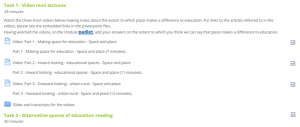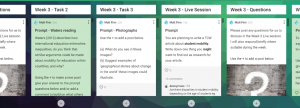Hi, I’m Millie, a final year Economics with Geography student. As a UEBS DLA I’ve spent a lot of time working and speaking with those in the Business School. But I recently decided to branch out my research to other departments. I’ve been speaking to two second year geography students about their experiences this year and this blog discusses their thoughts. It’s great to hear about how different departments are approaching the new digital learning environment.
Task checklists:
One simple, but effective thing highlighted by the two geography students as particularly favourable was the task setting on ELE. I’ve seen this work particularly well in my geography modules too! The Geography Department, as a whole, have been very consistent with their task setting approach on ELE pages. In previous years, we all experienced long lecture PowerPoints and never-ending PDF links to readings, both pretty daunting. What many students, like the ones I have spoken to, have found are far more clearer breakdowns of what is expected of them each week. With weekly topic sections that are then split into sub-sections. These sub-sections include estimated timings of tasks and tick-boxes so that completed work can easily be kept track of. It seems weird to think that something so simple has only just been introduced, but as a final year student, I am definitely thankful.

![]()
As lockdown continues and the days merge into one, I find it hard to keep motivated. Sometimes it’s really hard to organise your time efficiently when you actually have so much of it. It’s hard to switch off when you’re working, sleeping and chilling in the same room. I get it. But I wanted to share with you, the power of task setting and how the Geography Department has just made it that little bit easier for its students. I think it’s great that many geography module leaders have been trying to support their students with their organisation by offering task-based work. One student I spoke with agreed that the new ELE pages were far more systematic and efficient and the effort that geography module leads are putting in is visible.
However, it seems that sometimes timings are underestimated, leaving many students with excessive amounts of work to complete before their weekly seminars. I know the feeling of not wanting to attend a seminar because I’ve struggled to complete all of the work beforehand. Hopefully, as the term goes on lecturers can adapt the workload slightly. However, some students feel that when in-person teaching safely returns, they’d like to keep the weekly breakdown of material on ELE pages the same. It provides a direction and focus that I (and most probably many students) definitely appreciate because there’s nothing worse than being confused about what work needs completing when.

A variety of resources:
I believe task setting has encouraged module leads to insert a variety of resources into weekly tasks, replacing some of the more ‘traditional’ journal readings. I think it’s important to notice the immense potential and scope of online resources and whilst we’re consumed in this digital environment, we definitely should take advantage of that. Beforehand, both suggested and essential readings were sometimes crammed into the end slide of a PowerPoint (that realistically, were ignored by many students as we rushed to leave for our next lecture). The students I spoke with recently, praised the variety of tasks that some lecturers in the Geography Department have introduced this year. For example, replacing readings with short video clips, news extracts and the encouragement of interactive discussions. These new types of resources have been far more engaging for several students because the variety reduces the burden of having to read 150+ pages of academic journals. Some students have discussed their concerns to me regarding the reliability of online resources, sometimes they can be problematic, and the recent glitches with the online library has been frustrating.

Supporting digital resources:
Padlet seems to be a popular choice used throughout geography modules. Personally, I’ve had no issues with Padlet in my modules so far (touch wood). One student described their effectiveness as anonymous spaces where they can ask questions and respond to lecturer prompts. Have you ever sat there and thought about asking a question but decided not to, ‘just in case you look stupid’? I have. Well, Padlet is a great space to ask those questions in an anonymous way.

Interestingly, a few geography lecturers are adopting WordPress to create their own module pages. This seems to be admired by students because of the individuality of modules completed this way. From my experience of WordPress, I think it works incredibly well to create a clear layout of weekly content. Especially if the module leader is making use of many supporting resources, for example, videos, podcasts and further readings. It’s just a nice change from the usual ELE pages.

Are you from an alternative department?
The two students I spoke with stressed that not everyone is experiencing clearer task setting and a wider variety of resources. But one student believes (and considers themselves lucky) that the geography department has been putting in tremendous effort to ensure the success of online learning. I appreciate that everyone’s experiences differ across courses, so the students I spoke with are not representative of the whole community but it’s extremely encouraging to hear that the geography department is doing so well.
I would love to hear from more students across different departments, so that I can pick out some things that are working really well for you and those that may need to be improved. Thank you for reading!